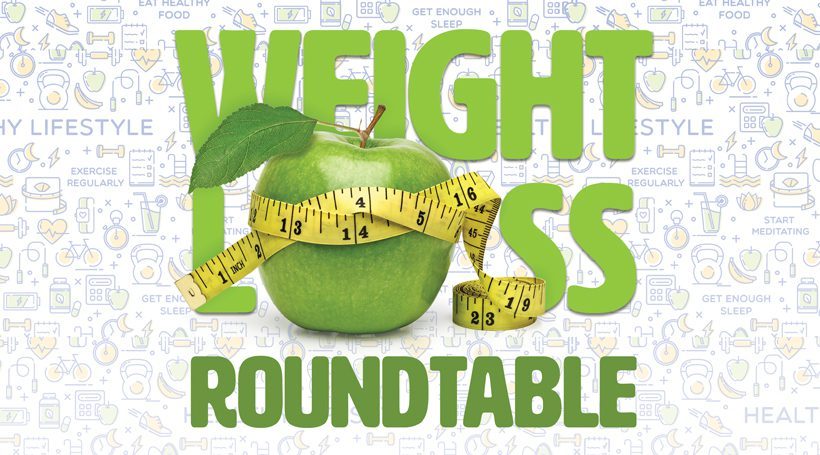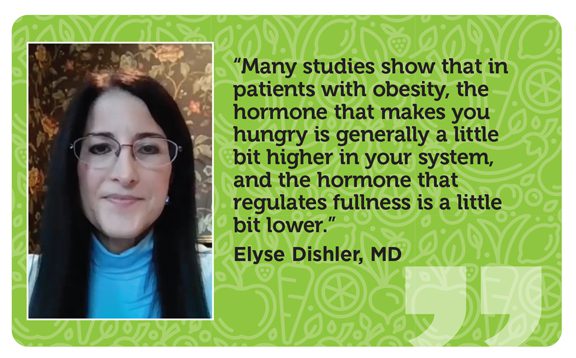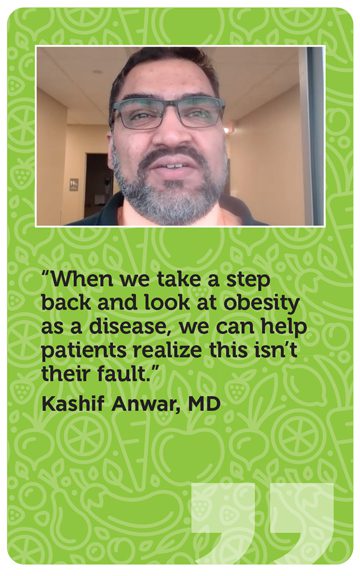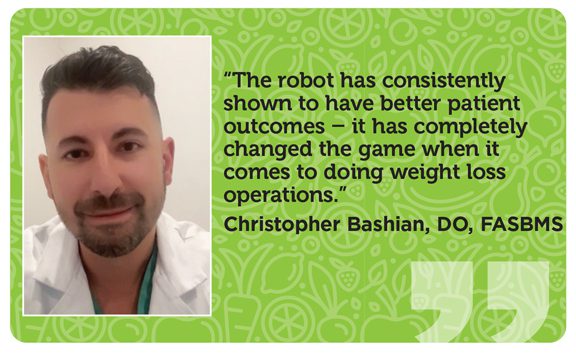
Participants:
Kashif Anwar, MD, Obesity Medicine Specialist, Capital Health
Marc Neff, MD, Director, Center for Surgical Weight Loss, Jefferson Health
Elyse Dishler, MD, Obesity Medicine Specialist, Medical Weightloss of Cherry Hill
Christopher Bashian, DO, FASBMS, Director of Metabolic and Bariatric Surgery Program, Inspira Medical Center Mullica Hill
As the new year begins, so does a new chapter in how the medical community – and the public – think about weight loss treatment. The need to lose weight is no longer discussed in whispers behind closed doors. In fact, it’s a conversation that could come up at a dinner party, among friends. Because people seem to better understand now something experts have been saying for years: Maintaining a healthy weight has been proven time and time again to prolong your life and enhance its quality. Plus, there are more options to help you lose weight, and they are easy-to-use treatments that have been proven effective and carry few side effects.
We wanted to get to the heart of the topic of weight loss, one of the few medical conditions that affects most people, so we asked 4 of South Jersey’s leading weight loss experts to talk with us about the latest advancements in their field, and the importance of their industry on our health.
Obesity as a disease…
In 2013, the American Medical Association finally pronounced that obesity is a disease. It’s not just a state of poor willpower. There are a lot of physiologic changes in patients who are in the overweight or obese category, where they just don’t regulate their hunger hormones correctly, so they oftentimes have excessive hunger and have a hard time getting full. It’s very hard for them to lower their calories and successfully lose weight. And, there are also over 200 genetic mutations that predispose people to obesity. You often see it in families where the grandparents, parents and children are all in the overweight category. Obesity is a disease state.
Elyse Dishler
The public needs to understand it’s not a personal failure. This is more ubiquitous than diabetes and heart disease and cancer. When you think of it as a disease, it changes the conversation. We only operate on 1% of the people who qualify, and we only prescribe medicine for 2% of the people who qualify. If people start to recognize that obesity is a disease, maybe we can make a bigger impact.
Marc Neff
We refer to obesity as the silent killer – you don’t always see the toll it’s taking on the body, especially when you’re younger. Many people don’t realize it has a direct correlation with many other diseases. It’s essentially the root of diseases like diabetes, high blood pressure, high cholesterol, sleep apnea, acid reflux, joint pain, gout, PCOS, the list goes on and on. So by treating the root of it all, you treat many things.
Christopher Bashian
We should all think of obesity as a disease because of the biological changes that occur. When fat cells become activated in our bodies, the different systems in our body significantly change how they function, which leads to a lot of changes in your physical health, and mental health as well. When we take a step back and look at it as a disease, that helps patients understand that it’s not their fault.
Kashif Anwar
On their patients…
Patients tend to be very frustrated because they’ve struggled with their weight their entire lives. They’ve tried multiple things, and while they have maybe been successful in the past, a lot of times they’ve regained the weight they lost and now they’re at their wit’s end.
Kashif Anwar
We see people who want to lose 10-15 pounds, we have people who need to lose 50 pounds, and we do have some who need to lose 100 or more. And they all want to lose weight for different reasons. The top reason is usually their appearance, and people who carry extra weight tend to be more depressed and more anxious. They feel out of control. That’s probably half my patients. The other half are concerned about their health. They may have high blood pressure, sleep apnea, terrible joint pain, they need a knee or hip replacement – there are so many different medical health problems that can be helped by losing weight.
Elyse Dishler
The people we see have tried everything to lose weight, and it just hasn’t worked. They feel they’ve exhausted all options, and now they’re looking for a permanent solution with surgery. We also have patients who are referred by other physicians because the patient is taking medications for obesity-related conditions and their dosages just keep going up and up. We are in the business of taking medications away, so patients become healthier.
Christopher Bashian
 On emotional relationships with food…
On emotional relationships with food…
We have such an unhealthy relationship with food in our world. Food is social. It’s a stress release. Food is celebratory. Food is, “Hi, how are you?” Food is, “Let’s congregate for the holidays” or “I feel bad about the day, I deserve this food.” If you don’t address that emotional part, anyone trying to lose weight is doomed to fail.
Marc Neff
A lot of people use food as emotional support for challenges they face in life, and not everybody is brought up in a household where they’re taught what’s healthy and what’s unhealthy. Children are rewarded with candy and sweets, and they frequently eat fast food. Our primary goal is education – teaching people what’s healthy to eat.
Christopher Bashian
I certainly have had patients who comfort themselves with food when they have stress in their lives. We work on coming up with some different behaviors that can distract them from overeating, like maybe, going outside to take a walk or calling a friend.
Elyse Dishler
Behavioral support and behavioral intervention has to be a big part of what we do, because food is everywhere. If I had a nickel for every time a patient said, Well, I’m Italian, I’m South Asian or I’m this culture, I probably could retire.
Kashif Anwar
On medications to help weight loss…
Some classes of today’s medications slow down your gastrointestinal tract, so you feel fuller. They make your body more sensitive to insulin, which helps promote breaking down excess body fat. And patients also report there are changes in how they think, so they are not thinking about food quite as much. They’ll say they would always be thinking about their next meal or planning a snack before they were on this medication. And now none of that’s there, none of that noise is in their brain.
Kashif Anwar
Weight loss medicines are allowing more people to face this disease of obesity. But I think it should be prescribed in the proper setting. Patients need the dietician, the psychological coaching, a diet and exercise plan. They need to learn how to change their eating habits, exercise habits, shopping habits, cooking habits, meal prep habits. I think we’re seeing a lot of people getting access to these medicines outside of a bariatric surgeon or obesity medicine specialist. That isn’t the ideal.
Marc Neff
There are great new medications that are pretty remarkable and extremely helpful with weight loss. They work on your brain to diminish hunger and cravings. And they also work to slow stomach emptying, so people stay full for a longer time. They make it about a million times easier for someone to lower their calories and not walk around starving. It’s very hard to lower your calories when you’re dealing with chronic hunger. Medication is one of the cornerstones of weight loss, along with good nutrition, behavior modification and exercise.
Elyse Dishler
Medications can be successful, but you have to use them for the right person. It shouldn’t be a blanket treatment. We’re running into a lot of issues with these medications. Insurance stops paying for them or the companies run low on supply. Patients also have to increase the dosage periodically, because the body develops tolerances to the current dose. When you increase the dose, you also increase the potential for side effects. Patients may have nausea, vomiting and abdominal pain. A lot of patients can’t tolerate those symptoms, so they end up stopping the medications. Then they’re back to square one.
Christopher Bashian
Advertised weight loss tools you should avoid…
There are so many over-the-counter supplements that are touted as great metabolism boosters or great for weight loss. But usually they have a ton of caffeine in them, and caffeine will suppress your appetite a little bit, but too much caffeine is really not good for your heart. There are all kinds of weird things that you see advertised on television, and I have patients who have tried them all. Nobody has had success.
Elyse Dishler
Be wary of labeling on regular foods – claims of organic, all-natural – that doesn’t mean that it’s good for you. Many times, it’s so watered down by corporate lobbying that these labels are slapped onto things that are very unhealthy for us. We’re also seeing a huge boom in patients taking protein drinks, yet some of these drinks don’t really have as much protein as they may advertise. Also, look at the ingredient list to see what other things are in there. Are there sugars? What kind of fiber components are there? Is there caffeine or other stimulants? Be very weary of what you may be drinking.
Kashif Anwar
Foods to eat less of…
What to avoid: Alcohol, soda, ultra-processed foods, super-high carbohydrates, incredibly large portion sizes, the low-fat products that replace fat with sugar. You can have these things in moderation, but really, it has to be in moderation.
Marc Neff
Soda has obscene amounts of sugar – we’re talking teaspoons upon teaspoons. If you compare it to whole fruits, which also have sugar, the fruit has fiber and other components that help you process the sugar. Soda doesn’t have that. So when you have that amount of added sugar, your body doesn’t know what to do with it. You’ll have an enormous spike in your insulin levels, which is going to cause you to feel much more fatigued. And repeated use of that is going to cause your body to start being more resistant to the insulin, so that can cause diabetes and other conditions down the line. Your body is going to try to move that sugar around, so it’s going to store it as fat.
Kashif Anwar
I try to use myself as an example. I’ll say, Do I occasionally eat dessert? Yes. Is it once a day? No. Is it once a week? No, it’s probably twice a month, maybe. I’m always working at it myself, making sure I keep a healthy diet and exercise multiple times per week. I try to show by example that balance and making healthy choices is a doable thing long term. It’s all in moderation.
Christopher Bashian
Sugar, obviously, is not good for you. It’s not good for your teeth, it’s not good for your body or your weight, but sugar also increases cravings. It’s a vicious cycle: People eat sugar, their glucose level rises very high, they feel pretty good. Then it crashes, and they get hungry and they crave more sugar. It turns into this vicious cycle where people just crave sugar and carbohydrates all the time. And that promotes weight gain. If I can get someone off sugar and simple carbohydrates like bread, white pasta, white rice and white potatoes for just one week, that can reduce sugar cravings and hunger. It also makes patients feel more in control over their eating.
Elyse Dishler
Which is more important: diet or exercise…
They go hand in hand. Changing your diet will get you to lose weight, but it’s only going to get you so far. To truly reach your weight loss goals, you have to incorporate consistent exercise, otherwise, you won’t see true success.
Christopher Bashian
Studies show that 70% to 90% of weight loss is from diet and maybe 10 to 30% is from exercise. Exercise alone won’t do it – you really need to change not just the amount of calories you take in, but also increase the nutrients in your diet. So diet is more important than exercise, but that doesn’t mitigate the importance of exercise. Both are very important for your overall health.
Elyse Dishler
When bariatric surgery is a good option…
I like to think of myself as a reluctant surgeon, almost like a vegetarian shark. Surgery is appropriate in most circumstances when all non-operative attempts have failed – the person has been supervised by a physician and went on a diet, exercise plan and medication. If that fails, then we go to surgery.
Marc Neff
If a patient is looking for significant weight loss, I am realistic when I talk with them about their goals. When needed, I will discuss the pros and cons of bariatric surgery. Some express right away that they don’t want surgery. Others will ask if they would be a good candidate, and I tell them my program coordinator is also the bariatric surgeons’ coordinator, so we can certainly get them more information on that.
Kashif Anwar
Bariatric surgery is a good option for people who are motivated, driven to learn and put in the work to improve their health. People who understand that this is about getting healthy, who understand this is also about reducing your medications and seeing resolution in some of your other health problems. This is about not having to go to the doctor’s office as frequently and feeling better. Those are the people who will see true success.
Christopher Bashian
The first year after surgery…
The big question we’re asked is: How much weight am I going to lose within that first year? We estimate based on the patient’s current weight subtracted by their ideal weight, which is the weight that patients would be with a BMI under 30. We take those two weights, subtract them, and that difference is what we call the excess weight, that’s what we’re trying to lose. Over the first year, there is a pretty wide range of percentage of that excess weight that’s going to be lost – it ranges anywhere from 50% to 80%. But that number will depend on patient compliance and dedication, how much they’re going to commit themselves to this journey.
Christopher Bashian
That first year after surgery is full of triumphs and “wow” moments and non-scale victories. Patients’ rings fit differently, shoes fit differently, clothes fit differently, and people who didn’t notice them before, now notice them. Some people lose friends, some people get disgusted with family members who are constantly telling them to eat this and don’t eat that. It’s a whirlwind of issues, and that’s 90% of patients. There are 5% or so of people who have some sort of surgical complication we help them through. And then to be honest, there are probably about 5% of people who don’t follow any of our recommendations. They drove the car off the lot and never open the owner’s manual. They go back to the same destructive lifestyle and have a poor outcome. But that’s a very small amount of people.
Marc Neff
What happens during bariatric surgery…
I do all of my bariatric operations robotically, and most patients in our practice receive a sleeve gastrectomy. Robotic instruments are placed inside the abdomen, and we use a stapling device to divide the stomach essentially in half, vertically. The stomach that remains takes the shape of a skinny tube. The other piece of stomach is removed from the body. So you now have a smaller container, which limits the quantity of food you can eat at one time, and the piece of stomach that was removed is where the hunger hormone is made, so your appetite will decrease.
Christopher Bashian
An analogy I use in my office is I ask patients what phone they use, Android or Apple. I ask them to pull it out, and then I take it away. I tell them I’m going to give them the other brand, and that’s the one they’ll have for the rest of their life. It’s going to be upsetting and frustrating, and they’re going to have to learn how to do some things differently, but they will be successful if they embrace this whole new experience. The machinery of the body – every organ system – will all start to work better as they lose weight and make these changes.
Marc Neff
Is bariatric surgery safe…
Bariatric surgery has evolved, and the way it’s been developed and how the techniques have advanced has made it extremely safe. The complication profiles are so low, we rarely see any sort of issues.
Christopher Bashian
Bariatric surgery has never been safer. It’s safer than heart operations. It’s safer than hip operations and, statistically, it’s safer to have this surgery and get the weight off than not to.
Marc Neff
A patient they’ll always remember…
One of my first patients called the office and said, “I need to get in today. This is an emergency.” When he got to the office, he could barely walk through the front door. We had to use 2 scales, side by side to weigh him, and he weighed over 550 pounds. With a lot of help and time and a medical meal replacement program, he was able to lose 230 pounds. He went from not being able to walk more than a couple steps without having to sit down to exercising at the gym regularly to power walking with his wife and swimming in the ocean. He told me he had jumped the waves in the ocean for four hours, and it was easy. His whole life changed. I have so many memorable patients who have had so many great results, but he is the most memorable.
Elyse Dishler
The past year has probably been the most fulfilling for me, and that has a lot to do with the increase in medications and seeing patients having, on a grander scale, life-changing results. It’s so gratifying to see how much better things get when you have a manageable weight.
Kashif Anwar
I had a patient who started at a little over 320 pounds, and now one year after surgery, she’s 185. She took every tool we gave her, and she used it to her advantage. She absorbed all the information, all the education, and made it her priority. She’s off her diabetes medications, and she no longer has any blood pressure issues. She can play with her 3 kids. It’s gratifying to be able to see that level of success. We’re so proud of her, and she’s so proud of herself which is the best part.
Christopher Bashian
I’ve been doing this since 2005, so of the 2000 or so patients who have come through there are a lot of really memorable people. But there is one patient who had surgery years ago, and she truly embraced and changed her lifestyle. She came to support group meetings and follow-up appointments. She did everything she was supposed to do and had a great outcome.
Marc Neff
One thing to start to do today to positively affect your weight…
Learn how to read a food label and what the numbers on the back of the packaging really mean. Just because something says zero calories and zero sugar, doesn’t mean it’s good for you.
Christopher Bashian
Pour the soda down the drain.
Kashif Anwar
Slow down. Practice self-care. Pay attention to your health.
Marc Neff
Increase your protein a little bit and decrease simple carbohydrates. Most important, eat a high-protein breakfast like Greek yogurt, eggs or cottage cheese. That will really set up your metabolism for the day.
Elyse Dishler





 On emotional
On emotional












